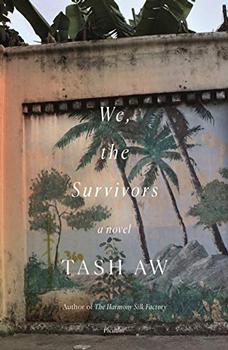Summary | Excerpt | Reviews | Beyond the Book | Readalikes | Genres & Themes | Author Bio

Guess that's why they never wanted to leave the village once they got there. For them, that was it. End of the road. Stop. Don't look back. Don't look ahead. Even if this new place turned out to be as bad as the one they'd left, they'd take their chances there. No going anywhere, ever again, not even to Klang for a movie. Their children were the same – all the people of my parents' age seemed to be attached to that coastline of rocks and mangroves and driftwood, sheltered by inlets and swamps. They started to fish, firstly to feed themselves, then, after the war, to sell in the small markets down the coast. One generation handing on its work to the next – the only heirloom we had. The men out in the boats at sea, the women sewing the nets in the village, the children gutting the fish in rickety shacks perched on stilts over the muddy banks – a way of life that didn't change for nearly half a century, until the first bridge was built across the rivermouth in the early 1980s.
The other day at church I was sorting through the pile of books and magazines that people had donated – old paperbacks and textbooks dumped on a table in the hall where we have tea and cakes after mass. One of my little jobs at church is to arrange the books and empty the donations box. There's rarely much money in it. Sometimes people might take a copy of Twilight, but they don't put any money in. That day someone had left a whole stack of old Time magazines from 1979, 1980 – just a few years after I was born – and out of curiosity I took them home with me. I stayed up all night looking at the photos. The president of the United States was shot. Shot! Can you believe that? John Lennon got shot too. Hundreds of thousands of people on the streets in Cuba. Russians fighting in Afghanistan. The whole world was changing. Our own country must have been changing. And all I could think was: How did we stay the same? The people of the village – my grandparents, my parents, even the children – we must have been trying to protect ourselves against all of the things going on around us. That's what our village meant to us: it existed to prevent us from knowing what was happening in the world. There can't have been any other explanation.
But once the bridge was built, things were different. Not long after, the businessmen from down south started building small factories around Kuala Selangor to clean and process the fish and distribute it around the country. We caught mainly white pomfret and prawns – delicate produce that required careful attention. The factories worked faster than we could, and more hygienically too, they said. That was what all the big supermarkets in the cities wanted, those giant air-conditioned spaces that were just starting to be built, so we sold them our catches cheap and let the flimsy gutting shacks fall slowly into the sea.
It was better that way, the villagers said – now at least we can save time and catch more fish, and our kids can go to school instead of cleaning fish and repairing nets with the women. But still we didn't go to school. We were supposed to, but no one really did. We turned up sometimes if we felt like it, we messed around, we cut classes, went out instead into the fields and plantations, smoked cigarettes, planned our escape from the village. Hong Kong, San Francisco – we imagined those places were just across the water, and that with a bit of cash in our pockets we could hop on a ship and start afresh there, just like our grandparents had when they'd come from Indonesia, or our ancestors who'd made it across from China a century before we were born. It seemed so easy.
But when I think back to that time, I realise that of course we didn't seriously believe we were going to end up living in America. It was just a vague idea – a longing to be some place better than where we found ourselves. Those kinds of ambitions belonged to people like you, not people like us. You know what I mean – people who lived in the cities, who went to decent schools. We were just village kids, messing around. One or two of the kids, the serious ones at school who worked hard and passed all their exams, they would only end up in a college nearby in Klang, or train to be a teacher. Keong and I and the rest of the children from the village, we didn't want that life. We wanted to be tycoons. But the funny thing was, we also knew we weren't going to become tycoons. How to explain this? The more we longed for something, the more impossible it became. You only dream about things you can never obtain.
Excerpted from We, the Survivors by Tash Aw. Copyright © 2019 by Tash Aw. Excerpted by permission of Farrar, Straus & Giroux. All rights reserved. No part of this excerpt may be reproduced or reprinted without permission in writing from the publisher.




From the moment I picked your book up...
Click Here to find out who said this, as well as discovering other famous literary quotes!
Your guide toexceptional books
BookBrowse seeks out and recommends the best in contemporary fiction and nonfiction—books that not only engage and entertain but also deepen our understanding of ourselves and the world around us.